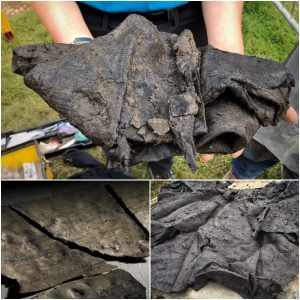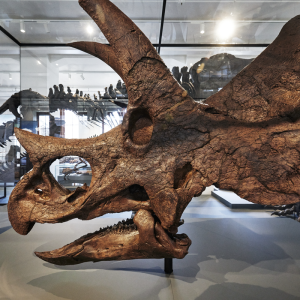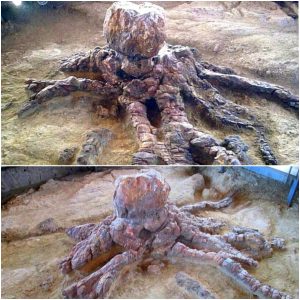
The 300-pound head of a sphinx that emerged from the dunes on California’s central coast traces its roots to Hollywood, not Egypt. The artifact is now on display at a little-known archaeology site and wildlife refuge in the farm town of Guadalupe, eight miles northwest of Santa Maria.
The Dunes Center works on excavating items unearthed from the massive set where Cecil B. DeMille filmed the silent movie “The Ten Commandments” in 1923. It’s a registered archaeological site.
“Most of it is just rubble,” said Doug Jenzen, the center’s executive director. “That’s what makes this so special.”
The sphinx head, delicately unearthed in November by a team of six archaeologists, stands 6 feet tall and weighs 300 pounds.

“It’s highly unlikely we’re going to find anything else of this quality. The fact that it survived this long is miraculous,” Jenzen said.
It took 1,300 people and 3,000 animals to construct the set in Santa Barbara County, where the Guadalupe-Nipomo Dunes stood in for ancient Egypt.
After filming, DeMille left the massive pharaoh’s gate in the shifting sand rather than dismantling or removing it. Over the years, portions of the 12-story, 720-foot backdrop complete with 21 plaster sphinxes crumbled and were buried in the scenic coastal dunes.

As it disappeared, the movie set became known as the Lost City of DeMille.
The center raised more than $500,000 for excavations in the dunes. The rest of the artifact, the sphinx’s body, remains intact in the sand. Janzen said it would take another $150,000 to safely remove it.

The dunes are worth a visit for other reasons too. The Guadalupe-Nipomo Dunes National Wildlife Refuge, which covers more than 2,500 acres, is home to species such as the Western snowy plover and giant coreopsis. It also is recognized as a National Natural Landmark.
The center manages conservation efforts at the dunes, which are home to protected flora and fauna. Educators organize guided hikes through the dunes, located about five miles northwest of the town of Guadalupe.
The faux sphinx can be viewed at the Dunes Center from 10 a.m. to 4 p.m. Wednesdays through Sundays. Adult admission is $7; children 12 and younger are free.





